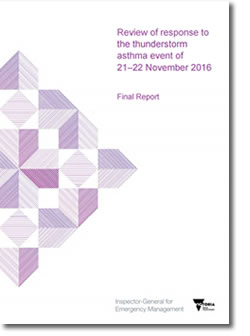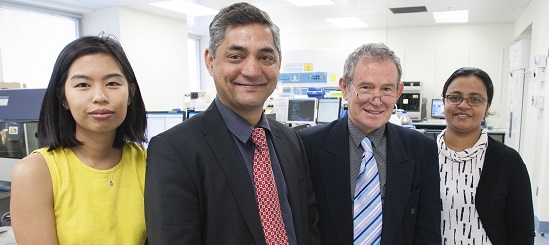The final report into the Victorian thunderstorm asthma event in November 2016 has prompted $15.56 million dollars in funding
 The final report into last year's unprecedented thunderstorm asthma emergency in Victoria that is believed to have contributed to the deaths of nine people and sent many more to hospital, has been handed down.
The final report into last year's unprecedented thunderstorm asthma emergency in Victoria that is believed to have contributed to the deaths of nine people and sent many more to hospital, has been handed down.
While the report found no evidence that the extent or duration of this event could have been predicted, it does include 16 recommendations to ensure both the emergency management and health sectors are better prepared for future events.
The government has accepted all 16 recommendations in the report which include:
-
More research to improve our understanding and treatment of thunderstorm asthma
-
Research to inform forecasting, modelling and response protocols
-
Emergency management training for hospitals and health workers
-
Education and engagement campaigns to assist communities to prepare for and respond to epidemic thunderstorm asthma
-
Increased monitoring and interpretation of pollen data
-
Improved real-time monitoring of data sources, including emergency department demand.


 As children all around Australia start a new school year it is time to think of updating ASCIA action plans, making sure adrenaline (epinephrine) autoinjector devices are in date and informing the school and the teacher of a child's known allergies.
As children all around Australia start a new school year it is time to think of updating ASCIA action plans, making sure adrenaline (epinephrine) autoinjector devices are in date and informing the school and the teacher of a child's known allergies.
 Eczema or atopic dermatitis occurs in 1 in 5 children under two. In people with eczema the skin barrier does not work as well so moisture is easily lost, causing the skin to dry out and be more susceptible to allergens and irritants.
Eczema or atopic dermatitis occurs in 1 in 5 children under two. In people with eczema the skin barrier does not work as well so moisture is easily lost, causing the skin to dry out and be more susceptible to allergens and irritants. We are proud to announce that the AusPollen project has been awarded $626,442 in the latest round of NHMRC Partnership Project grants with a further $653,129 in partner organisation in kind and cash support. AusPollen, the Australian Pollen Allergen Partnership, will build, implement and evaluate the first standardised national pollen monitoring network.
We are proud to announce that the AusPollen project has been awarded $626,442 in the latest round of NHMRC Partnership Project grants with a further $653,129 in partner organisation in kind and cash support. AusPollen, the Australian Pollen Allergen Partnership, will build, implement and evaluate the first standardised national pollen monitoring network. The AIFA team is raising money for allergy research by walking 14km from the centre of Sydney to Bondi Beach during the annual City2Surf.
The AIFA team is raising money for allergy research by walking 14km from the centre of Sydney to Bondi Beach during the annual City2Surf.